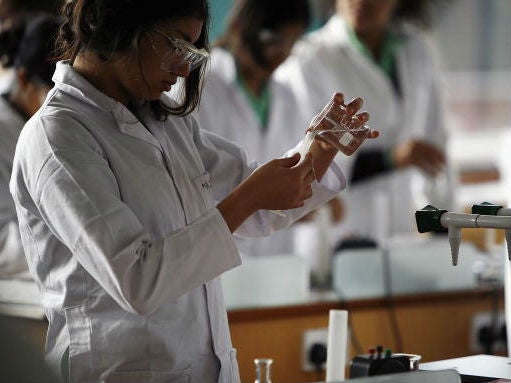A £2m mathematics prize? That is treating Stem subjects with the reverence they deserve
Hopefully prizes like this can encourage more young people – particularly women – towards studying science, technology, engineering and maths, writes Konnie Huq


A UK mathematician has won the most lucrative prize in academia. Martin Hairer, a researcher at Imperial College, landed the £2.3m award for his work on stochastic analysis.
I know. It’s to do with how random occurrences can turn the maths of normal things into hugely complex problems. His work has been described as so great and advanced, it is like that of alien being! He currently lives in a rented flat with his wife, a fellow mathematician.
He can buy a house now – more than one if he’s feeling fruity. And he can buy a new car to park in the drive – more than one… Mr Hairer can do the maths better than me. The possibilities are endless. This news brings music to my ears: it’s time to glamorise science a bit – and undoubtedly money can add a bit of glamour.
Brilliant academics and scientists frequently go unnoticed. How many Nobel prize winners can you name? How many pop stars can you name? Most people have heard of Harry Styles but have you heard of Tu Youyou? She won a Nobel prize in 2015 for her work in creating an anti-malaria drug that saved millions of lives in Asia and Africa. Her discovery of artemisinin and dihydroartemisinin has helped significantly improve the health of people living in tropical climates. But hey, Harry Styles sung some nice songs.
I have long been an advocate of trying to get more young people into science, technology, engineering, and mathematics (Stem) learning and professions – but to youngsters the lure of being Harry Styles remains more appealing. The UK lags well behind its European counterparts when it comes to getting people into Stem professions – and even more so when it comes to women.
When my parents came over to the UK in the 1960s, they had dreams of their three daughters becoming doctors, accountants or engineers. Where they came from, a career in Stem was a revered path to follow, something to aspire to. They landed in the UK to find the revered paths here more likely to lean towards becoming a fashion designer, pop star or actress. Being a TV presenter was no way near as cool as being a scientist in their eyes.
It’s all about changing preconceived notions and cultural mindsets – It’s been said before, but it's time to rebrand science.
Practical science is often only encountered in secondary school, but the earlier kids are subjected to things the less alien they are. Let’s give scientists big cash prizes, dispel stereotypes, increase diversity and make science the revered career path it should be.
The Cookie! book series by Konnie Huq – about a nine-year-old girl who is into science and learning – is out now

Bookmark popover
Removed from bookmarks